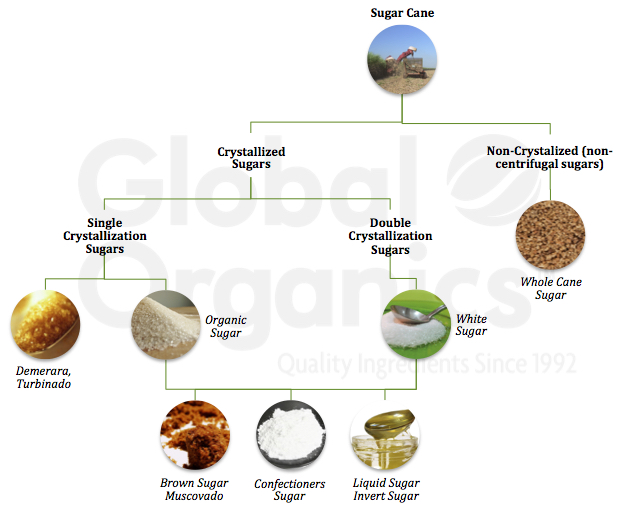The Environmental Impact of Growing Sugar and Cane in Various Regions
The Environmental Impact of Growing Sugar and Cane in Various Regions
Blog Article
Why Walking Cane Sugar Processing Chemicals Are Important for Modern Sugar Refining
The duty of cane sugar processing chemicals in contemporary sugar refining can not be overemphasized, as they are important to boosting both the performance of extraction and the general quality of the last item. Representatives such as phosphoric acid and details flocculants are used to eliminate contaminations, resulting in sugar that not just fulfills customer assumptions yet additionally sticks to sector criteria.
Duty of Handling Chemicals
The efficiency of cane sugar processing pivots dramatically on the tactical application of handling chemicals. These chemicals play an essential function in enhancing the performance and quality of sugar extraction and refining. From the preliminary phases of juice extraction to the final filtration actions, handling chemicals help with different essential operations.
In the removal phase, chemicals such as phosphoric acid and calcium hydroxide are employed to maximize the information process, aiding to eliminate impurities and put on hold solids from the walking stick juice. This not only boosts the yield but also guarantees the quality of the end product. In addition, agents like flocculants aid in the fast settling of impurities, thereby enhancing the overall process.
As the processing developments, chemicals are utilized in decolorization and crystallization phases. Triggered carbon and ion exchange materials serve to eliminate shade and odor, making sure that the refined sugar satisfies customer high quality criteria. Ultimately, the duty of processing chemicals prolongs past operational efficiency; they considerably impact the sensory attributes of the final item, adding to market competition. Thus, the precise selection and application of these chemicals are crucial for accomplishing ideal end results in walking stick sugar processing.
Trick Kinds of Chemicals
Walking stick sugar processing counts on a selection of key chemicals that help with each stage of manufacturing. These chemicals play essential duties in clarifying, bleaching, and purifying the sugar extracted from walking cane.
One key group of chemicals consists of flocculants, such as polyacrylamide, which help in the clarification process by promoting the aggregation and settling of pollutants. In addition, calcium hydroxide is frequently utilized to reduce the effects of level of acidity and aid in the removal of non-sugar parts.
Lightening agents, such as triggered carbon and sulfur dioxide, are utilized to decolorize the syrup, resulting in a clearer end product. These chemicals aid remove shade compounds that may affect the sugar's appearance and bankability.
Furthermore, phosphoric acid functions as a pH regulator during the handling phases, making certain optimum problems for the enzymatic activities involved in sugar removal and filtration.
Various other crucial agents consist of edta (ethylenediaminetetraacetic acid), which chelates metal ions that can militarize undesirable responses, and sodium hydroxide, which assists in pH control throughout the refining procedure. Collectively, these chemicals boost performance and make certain a high-quality walking cane sugar product.
Benefits for Sugar High Quality
Often forgotten, making use of certain handling chemicals significantly enhances the general top quality of walking cane sugar. These chemicals play a crucial duty in refining processes, ensuring that the end product satisfies rigid market requirements for purity and taste.

In addition, refining chemicals help in accomplishing a regular granulation and structure, which are crucial for consumer approval. By managing the condensation process, these chemicals guarantee that the sugar crystals develop evenly, resulting in a more enticing item that liquifies well in numerous applications.
Additionally, making use of these chemicals can boost the shelf life of walking cane sugar by lessening dampness absorption and microbial development. On the whole, the calculated application of processing chemicals is important for delivering top notch walking cane sugar that satisfies customer assumptions and industry needs.
Environmental Impact Factors To Consider

In addition, click here for more the energy-intensive nature of sugar refining, compounded by chemical use, usually causes increased carbon emissions. This adds to environment modification and raises problems regarding the sustainability of current refining methods. In addition, the sourcing of these chemicals may involve practices that endanger biodiversity, such as monoculture farming, which decreases the durability of farming environments.

To reduce these impacts, sugar refiners are progressively exploring sustainable options and taking on finest techniques that minimize chemical usage. Implementing extensive environmental administration systems can help ensure that the refining procedure lines up with environmental standards and promotes biodiversity. Eventually, a balanced strategy that prioritizes both sugar quality and environmental stewardship is vital for the long-term stability of the sugar industry.
Future Fads in Refining
As the sugar sector comes to grips with the ecological challenges associated with standard refining approaches, cutting-edge approaches are emerging to boost both efficiency and sustainability. One substantial pattern is the adoption of green chemistry concepts, which prioritize the usage of safe, naturally degradable processing chemicals. This shift not just reduces ecological impact however likewise addresses customer demand for cleaner manufacturing methods.
An additional encouraging growth is the implementation of sophisticated filtration technologies, such as membrane separation and adsorption procedures. These techniques boost the clarity and top quality of the read more sugar while reducing the quantity of wastewater generated throughout refining. In addition, the integration of digital modern technologies, including IoT and AI, is transforming operational performance by allowing real-time surveillance and anticipating upkeep, thus lessening source waste.
Furthermore, making use of byproducts from sugar refining, such as bagasse and molasses, is gaining traction. These products can be exchanged biofuels or value-added items, adding to a round economy within the sector. Jointly, these patterns signal a shift in the direction of even more lasting practices that not only boost operational efficiency however additionally line up with global sustainability objectives, making sure the future practicality of sugar refining.
Conclusion
Cane sugar processing chemicals are important in modern-day sugar refining, dramatically improving the effectiveness and quality of sugar extraction. The tactical usage of these chemicals not only improves the purity and taste of the end product but additionally guarantees consistent condensation and texture. As the market increasingly prioritizes sustainability, the fostering of environmentally-friendly handling agents is likely to form future fads in refining, eventually causing better items and expanded life span for customers.

Inevitably, a balanced strategy that prioritizes both sugar high quality and environmental stewardship is important for the long-term practicality of the sugar sector.
Cane sugar handling chemicals are vital in modern sugar refining, considerably improving the effectiveness and high quality of sugar extraction.
Report this page